Between 1902 and 1908, The Gramophone Company of London organised three expeditions to the Indian subcontinent and recorded more than 5,000 songs. Most of these songs were from theatre and classical music.
The recordings also included compositions sung by women entertainers, whose music was otherwise not accessible to most listeners. In the first few years of recording, namely 1902 to 1905, these women performed only for zamindars and other wealthy patrons.
During the same period, other recording companies were also active in Mumbai, such as Ramagraph, Singer, James-Opera, Beka (all German), Pathe (French), Sun (British).
All these companies' recordings included items of imitation, mimicry and comic songs.
Here are selections from this genre on the Beka label, which was owned by H Bumb and M Koenig. The name of the label splices together the first letters of the founders' last names, as rendered in German.
This song is by Shaikh Abdul Rathman. The song title on the disc appears in both Roman and Urdu scripts, and the word 'Germany': appears at the bottom of the circular border of the record, indicating where the disc was pressed.
Imitation of Animals by Shaikh Abdul Rathman.
In 1905, the car was a novelty, owned by only a few, rich people. It was a big event for someone to drive a car down the road. People would flock to watch. In those days, just starting the car was a production: one had to rotate a handle-driven fan to start the engine, and once the car revved up, furiously blow the horn to get spectators to move out of the way. The Motor Car Song, sung by Maneklal, describes this spectacle.
Gujrati Motor Car Farce by Maneklal.
Between 1902 and 1910, Kolkata was a hub of political activity, whereas Bombay was primarily a centre of business and trade. The ethos of the country's financial hub is reflected in several recordings of songs from the Gujarati theatre. Here is one sung by Sorab Rustamji Dhondi, from the drama Khurshide Jarnigar, describing the importance of money.
Khubi Saari Paiseki by Sorabji Dhondi, from the Gujrathi drama Khurshide Jarnigar.
Sorabji Dhondi was a versatile actor singer in the Gujarati and Parsi theatres. He sang and recorded songs, dialogues and skits, cutting more than 100 songs on 78-rpm discs across a number of labels. Here are two songs from his famous stage plays, Bhulbhulaiyaa and Harishchandra. In this song, he describes scenes from a train journey.
Rail Gadi by Sorabji Dhondi
Rang Bhang Ka Lota Comic by Sorabji Dhondi
The recordings also included compositions sung by women entertainers, whose music was otherwise not accessible to most listeners. In the first few years of recording, namely 1902 to 1905, these women performed only for zamindars and other wealthy patrons.
During the same period, other recording companies were also active in Mumbai, such as Ramagraph, Singer, James-Opera, Beka (all German), Pathe (French), Sun (British).
All these companies' recordings included items of imitation, mimicry and comic songs.
Here are selections from this genre on the Beka label, which was owned by H Bumb and M Koenig. The name of the label splices together the first letters of the founders' last names, as rendered in German.
This song is by Shaikh Abdul Rathman. The song title on the disc appears in both Roman and Urdu scripts, and the word 'Germany': appears at the bottom of the circular border of the record, indicating where the disc was pressed.
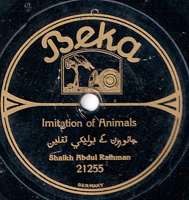
Imitation of Animals by Shaikh Abdul Rathman.
In 1905, the car was a novelty, owned by only a few, rich people. It was a big event for someone to drive a car down the road. People would flock to watch. In those days, just starting the car was a production: one had to rotate a handle-driven fan to start the engine, and once the car revved up, furiously blow the horn to get spectators to move out of the way. The Motor Car Song, sung by Maneklal, describes this spectacle.
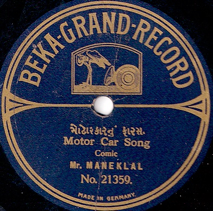
Gujrati Motor Car Farce by Maneklal.
Between 1902 and 1910, Kolkata was a hub of political activity, whereas Bombay was primarily a centre of business and trade. The ethos of the country's financial hub is reflected in several recordings of songs from the Gujarati theatre. Here is one sung by Sorab Rustamji Dhondi, from the drama Khurshide Jarnigar, describing the importance of money.
Khubi Saari Paiseki by Sorabji Dhondi, from the Gujrathi drama Khurshide Jarnigar.
Sorabji Dhondi was a versatile actor singer in the Gujarati and Parsi theatres. He sang and recorded songs, dialogues and skits, cutting more than 100 songs on 78-rpm discs across a number of labels. Here are two songs from his famous stage plays, Bhulbhulaiyaa and Harishchandra. In this song, he describes scenes from a train journey.

Sorabji R Dhondi.
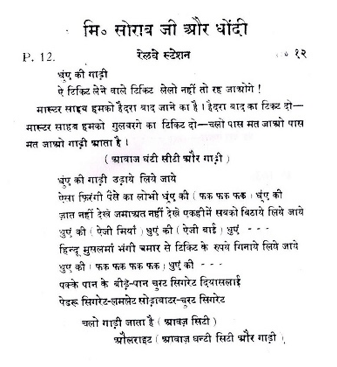
Rail Gadi by Sorabji Dhondi
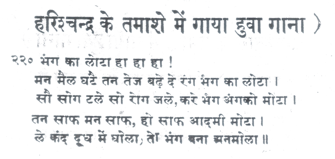
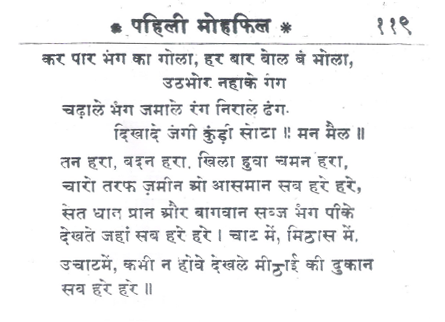
Rang Bhang Ka Lota Comic by Sorabji Dhondi
Buy an annual Scroll Membership to support independent journalism and get special benefits.

Our journalism is for everyone. But you can get special privileges by buying an annual Scroll Membership. Sign up today!
